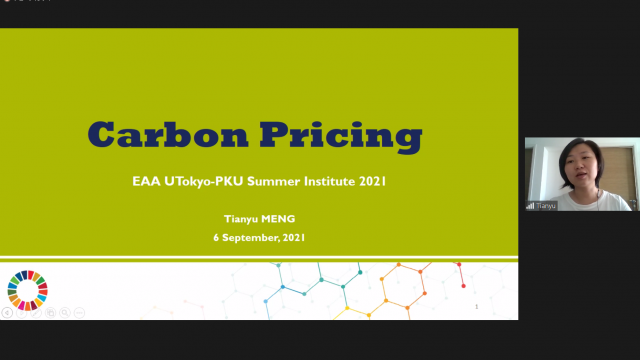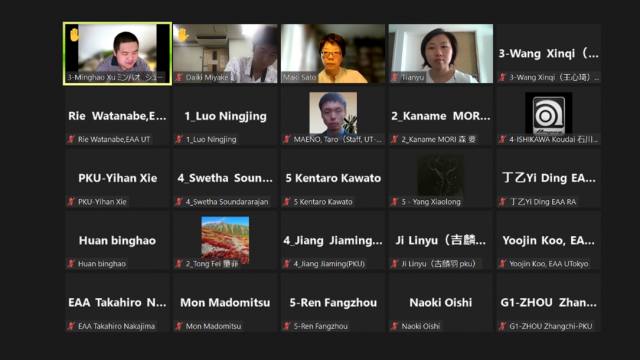On September 6, 2021, the two-day program of the EAA UTokyo-PKU Summer Institute 2021 started off with lectures by Professor Maki Sato (EAA) and Meng Tianyu (United Nations Development Programme). Having assigned the participants a reading of Immanuel Kant’s Perpetual Peace and “Answering the Question: What is Enlightenment?,” Sato praised Kant for encouraging us to use our own intellect in order to tackle the problems that all human beings face today. What are those problems? Sato briefly characterized the present era as the end of Pax Americana and the surge of a new type of colonialism, which indicate a change in the roles of sovereign states and a deadlock of global capitalism. Also crucial are global environmental problems and the state of volatility, uncertainty, complexity, and ambiguity that have become apparent in the current pandemic, and in the natural disasters caused by climate change.
These crises cannot be dismissed as only temporary, she argued, because they have their roots ultimately in the fundamental values of modernity. What we need to do, then, is to radically rethink our values. Here, Sato introduced a theoretical distinction, originally made by Prof. Takahiro Nakajima, between “value” and “value-ing.” With the suffix -ing that emphasizes the progressive aspect of “value” as a verb, value-ing means to reconceive fixed values and embed in them new possibilities of change. She added that value-ing is also “visiblizing (the) invisible.” The parentheses mean that what is invisible or has been invisiblized is not predetermined as such. Rather, she stressed, it is for us to discover and problematize it.
Sato’s lecture was followed by another lecture by Meng Tianyu on the current situation of carbon pricing. Meng, a program analyst at UNDP, gave an overview of the idea of carbon pricing in terms of the history of climate negotiations and as part of the ongoing international efforts toward carbon neutrality. Carbon pricing functions as a policy instrument that captures the external costs of greenhouse gas emissions. Today, sixty-four carbon pricing instruments (such as a carbon tax and emissions trading system) are in operation, covering 21.5 percent of global greenhouse gas emissions. Carbon pricing is a policy tool innovation that more and more developing countries today are keen to try. Meng pointed out, however, that we need to take time to ensure its effective function. The struggle to achieve low-carbon development by means of carbon pricing has only just begun, and it forms just one of many ongoing climate policies.

In the Q&A session, the discussion mainly focused on the limitations of carbon pricing, such as the potential volatility of carbon prices due to market mechanisms. It was emphasized that the carbon pricing system should be regarded as a learning-by-doing process, and that one of its important functions is to incentivize and signal industry to envision strategies for building a low-carbon society.

Reported by Yuki Ueda (EAA Research Assistant)








